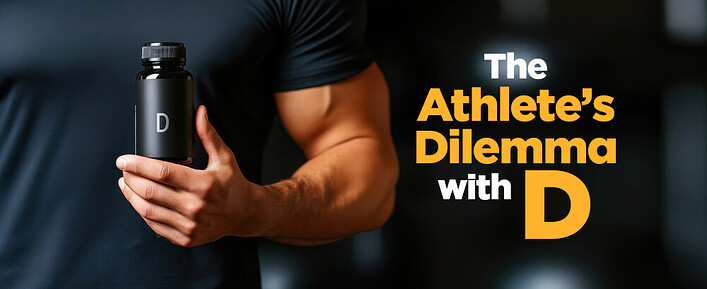Even with sunlight and vitamin D-enriched foods, over half of athletes aren't absorbing enough vitamin D. Here's why and how to fix it.
Most people today have at least a few nutritional deficiencies impacting their physical and mental well-being. But elite athletes? Surely their pristine diets have them covered, right?
Wrong. Despite their world-class performances, many suffer from the same insufficiencies or deficiencies as average, junk-food eating schmucks. And it's affecting how they feel and how they perform in their sport. A new study sheds more light on this common problem.
The Study
Researchers analyzed the vitamin D status of 474 German Olympic athletes, men and women, from 10 different sports. What they found was eye-opening:
- Over 55% had insufficient vitamin D levels.
- About 16% were completely deficient.
- Certain gene variations (polymorphisms) influenced vitamin D levels.
Athletes who practiced or played outside in the summer were less likely to be deficient, but even many of them had low vitamin D levels, possibly due to those pesky polymorphisms.
How does low vitamin D affect an athlete? He or she will recover more slowly, feel fatigued, experience muscle weakness, increase their injury risks, get sick more often, sleep poorly, lose mental focus, and suffer from more depression.
Is it a Diet or a Lack of Sunlight Issue?
Both could play a role, but in this study, they also examined 17 gene variants that affect how the body processes vitamin D. Vitamin D must be absorbed, transported, and activated to work properly, and specific genes control these processes. Some of these genes affect how the body makes vitamin D from food and sunlight.
If an athlete (or anyone else) has a gene variant that affects vitamin D processing, they might be deficient even with plenty of sun and the right foods.
How to Overcome Bad Genes
Athletes can "overwhelm" these annoying gene variants by doing two things:
1. Take More Vitamin D
Increasing intake through supplements can often raise blood vitamin D levels, even in people with gene variations that make vitamin D processing less efficient. For example: If a gene variant reduces vitamin D absorption, taking higher doses might provide enough raw material to compensate.
2. Take Microencapsulated Vitamin D3
This form of vitamin D is manufactured by encapsulating D3 molecules in solid lipid nanoparticles, making it highly bioavailable, even for people with tricky gene variants. The effects remain constant for up to 14 days, making it superior to conventional vitamin D supplements.
For example, if a gene variant reduces absorption in the gut (in genes like GC or DHCR7, linked to vitamin D transport or synthesis), microencapsulated D3 helps by delivering the vitamin more efficiently to the bloodstream.
Biotest recognized the value of this form and used it in D Fix High Absorption Vitamin D (Buy at Amazon). Each little softgel contains 5000 IU in a unique delivery matrix borrowed from the pharmaceutical industry.
For more info on vitamin D blood tests and dosing, check out: The New Vitamin D Guidelines for Superior Health.
And remember, your body needs adequate magnesium to transport, synthesize, and activate vitamin D. So, athletes should stay topped off with this vital mineral, too. Learn more here.
Reference
- Hacker, Sebastian. "Vitamin D Status and Its Determinants in German Elite Athletes." International Journal of Sports Medicine, vol. 46, no. 10, 2025, pp. 713–722.


